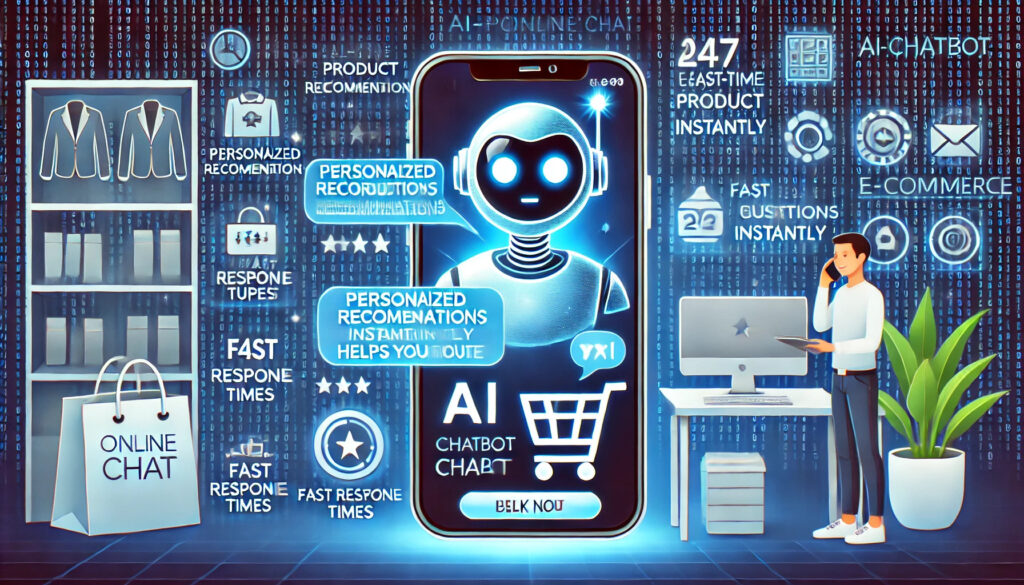Introduction
The ever-evolving landscape of e-commerce demands businesses to stay at the forefront of technology to maintain competitive advantages and ensure customer satisfaction. In this age of instant gratification, consumers expect seamless interactions, quick resolutions, and personalized services. Traditional customer service models, though effective in the past, are no longer capable of keeping up with the growing demands of today’s tech-savvy consumers. This is where online chat with AI has emerged as a revolutionary tool, offering scalability, efficiency, and accuracy in customer interactions.
Integrating AI chatbots into e-commerce has introduced innovative ways to enhance the customer experience, providing solutions that can handle everything from real-time problem-solving to offering personalized shopping suggestions. As businesses aim to reduce operational costs while improving customer satisfaction, online chat with AI becomes the perfect solution, automating mundane tasks and ensuring 24/7 availability. In this article, we will explore 5 brilliant solutions provided by online chat with AI, illustrating how they are transforming the e-commerce sector.

24/7 Customer Support Availability
History of Automated Support
The need for 24/7 customer support has always been a challenge for businesses, especially for e-commerce platforms that cater to a global customer base. Initially, businesses turned to Interactive Voice Response (IVR) systems to automate basic tasks. IVR systems, introduced in the 1980s, allowed customers to interact with machines to perform tasks like checking account balances or routing their calls to the appropriate department. However, these systems were limited in their ability to handle complex queries, frustrating customers with their rigid, menu-driven structures.
The emergence of online chat with AI systems has transformed automated support by offering flexible and intelligent chatbots that can respond to customer inquiries at any time. AI-powered chatbots can handle complex queries, understand natural language, and learn from previous interactions, allowing them to provide tailored responses to customers without human intervention. Unlike earlier automated solutions, these AI chatbots can simulate human conversation, making them much more effective and engaging.
Key Players in AI Chat Solutions
Leading companies like OpenAI, Microsoft, and Google have played pivotal roles in advancing AI chat technologies. For example, OpenAI’s GPT models have set the standard for natural language processing, enabling AI systems to understand context and deliver human-like responses. Microsoft has been instrumental in the deployment of these AI systems through its cloud-based Azure platform, which allows businesses to scale their AI chat solutions globally, handling millions of simultaneous interactions.
Facilities and Achievements
One of the most significant achievements of AI-powered customer support is its integration with back-end systems to automate real-time issue resolution. For example, Amazon has deployed AI chatbots to help with order tracking, returns, and customer inquiries, seamlessly pulling data from various systems to provide accurate responses. This integration has drastically reduced response times and improved the overall customer experience, showcasing the efficiency and reliability of online chat with AI.
Structure of AI Chat Systems
The architecture of AI chat systems is built around natural language processing (NLP) and machine learning algorithms, which enable chatbots to understand complex inquiries and provide accurate responses. AI writing assistants further enhance the interaction by generating clear and coherent responses in real-time. These systems are designed to mimic human interactions, making them valuable tools in improving customer engagement while reducing the workload for human agents.
Impact on E-commerce
The implementation of 24/7 customer support through online chat with AI has revolutionized e-commerce businesses by providing round-the-clock service, reducing operational costs, and improving customer satisfaction. AI chatbots can handle thousands of interactions simultaneously, ensuring that customers receive immediate support no matter the time of day. This level of efficiency would be impossible to achieve with human agents alone. However, some challenges remain, particularly in handling highly specific or complex issues that still require human oversight.
Personalized Shopping Experiences
History of Personalized Marketing
The idea of personalized shopping has been gaining traction for years, with companies realizing that tailored recommendations can lead to increased sales and improved customer satisfaction. Early efforts to personalize shopping experiences involved simple recommendation engines, such as those used by Amazon and Netflix, which suggested products based on users’ previous behavior. However, these systems were limited by their inability to understand the nuances of customer preferences in real-time.
Online chat with AI has taken personalization to the next level. AI chatbots can now interact with customers directly, providing product recommendations based on real-time behavior and past interactions. These chatbots can analyze vast amounts of data, including browsing history, previous purchases, and even customer feedback, to offer suggestions that align with individual preferences.
Organizations Behind AI Personalization
Major e-commerce players like Shopify, eBay, and Alibaba have successfully integrated AI chat systems to enhance personalization. These companies utilize AI chatbots not only to offer product recommendations but also to guide customers through the shopping process, answer questions, and even help with checkout. By integrating AI writing assistants into their systems, they are able to generate personalized content for each customer interaction.
AI Facilities for Personalization
The personalization process involves advanced AI algorithms that continuously learn from customer interactions. These algorithms track customer behavior, identify patterns, and predict future needs, allowing AI chatbots to provide tailored shopping experiences. For instance, AI chat online systems can suggest complementary products, offer discounts based on purchase history, and even send reminders for items left in the cart.
Components of AI-Powered Personalization
At the core of AI-powered personalization are machine learning models designed to process large datasets in real-time. These models analyze customer preferences and use AI chatbots to deliver relevant recommendations. AI writing assistants help improve communication by ensuring that responses are consistent with the customer’s shopping journey, whether through product suggestions or helpful content.
Assessment of Impact
The impact of AI-driven personalized shopping experiences on e-commerce has been immense. Businesses report higher conversion rates, improved customer retention, and increased customer engagement. However, personalization comes with its own set of challenges, particularly when it comes to maintaining privacy and adhering to data protection regulations. Balancing the need for personalization with ethical data usage is a key issue for businesses adopting AI chat technology.
Real-Time Problem Resolution
History of AI in Issue Resolution
Before the rise of AI chatbots, solving customer issues in real-time was a labor-intensive process. Customers often had to wait on hold or send emails to resolve even simple problems, leading to frustration and dissatisfaction. The introduction of rule-based chatbots in the 1990s helped streamline some of these processes, but these systems lacked the flexibility to handle more complex issues.
The development of AI-powered chatbots has changed the game, allowing businesses to resolve problems instantly. AI chatbots can identify and troubleshoot common issues such as order delays, payment problems, or technical glitches, providing real-time solutions without the need for human intervention. This has significantly improved customer satisfaction and reduced the time spent waiting for support.
Key Figures in AI for Problem Resolution
Companies like Shopify and Zappos have embraced AI chat solutions for problem resolution, leveraging these systems to handle customer complaints quickly and effectively. These businesses have invested heavily in AI chatbots that can resolve common issues without escalating them to human agents, freeing up support teams to handle more complex tasks.
Achievements in Problem Resolution
The integration of AI chatbots into customer support systems has led to faster resolution times and improved customer satisfaction. E-commerce businesses using online chat with AI have reported that over 70% of customer inquiries are resolved without the need for human intervention. This reduction in workload has allowed businesses to focus on strategic growth while maintaining high levels of customer support.
AI Chat Structure for Support
AI chatbots designed for problem resolution are integrated with back-end systems such as order management and CRM platforms. This integration allows the bots to access customer information, retrieve order details, and provide solutions in real-time. AI writing assistants are employed to ensure that the chatbot responses are clear, concise, and informative, maintaining a high standard of customer service.
Results and Challenges
While AI chatbots have proven highly effective at resolving common customer issues, some challenges remain. Complex or unique problems that require human judgment can still be difficult for AI chat systems to handle. As a result, many businesses are adopting a hybrid approach, where AI chatbots handle routine tasks while human agents take over for more complicated issues.
Handling High Volume of Queries
Evolution of AI for Query Handling
As e-commerce platforms grew in size, the volume of customer inquiries increased, making it difficult for human agents to keep up. Live chat systems helped alleviate some of the pressure, but human agents were limited in the number of queries they could handle simultaneously. The introduction of AI chatbots has been a game-changer in this regard, allowing businesses to handle thousands of inquiries at once, without compromising response quality.
Companies Leading in AI Query Systems
Companies like Zendesk and Freshdesk have integrated AI chat into their platforms, allowing e-commerce businesses to automate responses to frequently asked questions. These systems are designed to recognize patterns in customer inquiries and provide accurate, pre-programmed responses, reducing the need for human intervention.
Facilities for Managing Large Volumes
The ability of AI chat systems to handle high volumes of inquiries lies in their architecture, which allows them to process and respond to multiple conversations simultaneously. E-commerce platforms can integrate these systems with their existing customer service platforms, ensuring that customers receive quick and accurate responses, even during peak periods like Black Friday or Cyber Monday.
Components of AI for Query Management
The AI chat systems used for managing high volumes of queries rely on machine learning algorithms to recognize common questions and generate appropriate responses. These bots are also capable of escalating more complex queries to human agents when necessary. AI writing assistants further enhance these interactions by ensuring that responses are well-structured and informative.
Evaluating Effectiveness
The effectiveness of AI chatbots in managing large volumes of queries has been widely recognized. Businesses using these systems have seen a reduction in wait times, an increase in customer satisfaction, and a more efficient use of human resources. However, challenges remain in ensuring that AI chatbots can handle nuanced queries, which is why many businesses use a combination of AI and human support.
AI-Driven Sales Assistance
History of AI in Sales Assistance
AI has long been used to assist with customer purchases, but early systems were limited to basic recommendation engines. With the advent of AI chatbots, sales assistance has become more interactive and dynamic. AI-driven online chat systems can guide customers through the buying process, recommend products, and answer questions in real-time, leading to increased sales.
Key Players in AI Sales Solutions
Companies like Salesforce and HubSpot have integrated AI chat into their CRM platforms to help businesses automate sales processes. These tools allow sales teams to focus on more complex tasks while AI chatbots handle routine inquiries, upselling, and cross-selling opportunities.
Success Stories in AI Sales
Many e-commerce platforms have seen significant sales increases after implementing AI-driven online chat systems. For instance, Best Buy has used AI chatbots to assist customers during the holiday shopping season, helping them find products, answer questions, and complete purchases. This has led to higher conversion rates and reduced cart abandonment.
Components of AI Sales Systems
The architecture of AI sales systems is designed to guide customers through the buying journey. AI chatbots can answer product-related questions, suggest complementary items, and provide personalized recommendations based on customer behavior. AI writing assistants help ensure that these interactions are seamless and professional.
Sales Impact and Challenges
The impact of AI-driven sales assistance on e-commerce has been overwhelmingly positive. Businesses have reported increased sales, improved customer satisfaction, and higher conversion rates. However, challenges remain in ensuring that AI interactions feel personal and human, which is critical in building long-term customer relationships.
Conclusion
In summary, online chat with AI has transformed e-commerce by providing scalable, efficient, and intelligent solutions to common business challenges. From 24/7 customer support to personalized shopping experiences and real-time problem resolution, AI chatbots have revolutionized how businesses interact with their customers. As these systems continue to evolve, businesses must balance automation with human oversight to ensure that customer experiences remain positive and personal. The future of AI chat in e-commerce is bright, with endless opportunities to further improve customer engagement and drive sales.



